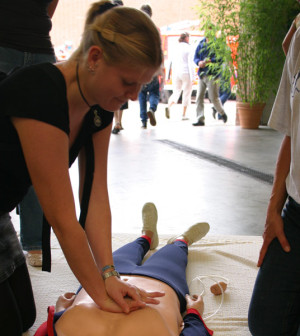- 10 Strategies to Overcome Insomnia
- Could Artificial Sweeteners Be Aging the Brain Faster?
- Techniques for Soothing Your Nervous System
- Does the Water in Your House Smell Funny? Here’s Why
- Can a Daily Dose of Apple Cider Vinegar Actually Aid Weight Loss?
- 6 Health Beverages That Can Actually Spike Your Blood Sugar
- Treatment Options for Social Anxiety Disorder
- Understanding the Connection Between Anxiety and Depression
- How Daily Prunes Can Influence Cholesterol and Inflammation
- When to Take B12 for Better Absorption and Energy
Many Americans May Experience ‘Silent’ Heart Attack

New research suggests that many Americans suffer “silent” heart attacks — events that go unnoticed but are serious enough to leave scars on the heart.
“We know that risk factors for heart disease — the number one killer of American men and women — are predominantly modifiable, so this finding gives further support to the notion that early identification and management of these risks is critical,” said Dr. Stacey Rosen, vice president of women’s health at The Katz Institute for Women’s Health in New Hyde Park, N.Y. She was not involved in the new research.
The study was led by Dr. David Bluemke of the U.S. National Institute of Biomedical Imaging and Bioengineering. His team looked at heart scans from more than 1,800 people, ages 45-84, from various ethnic groups who were free of heart disease when they enrolled in the study between 2000 and 2002.
Ten years later, all the patients underwent magnetic imaging scans to assess their heart health. Their average age at that time was 68.
The scans revealed that nearly 8 percent of the participants had scars caused by a heart attack, 78 percent of which had previously gone undetected.
Men were much more likely than women to have this type of scar, nearly 13 percent vs. 2.5 percent, respectively. Other factors associated with a higher risk of heart scarring included smoking, being heavier, higher levels of heart disease-linked calcium deposits in arteries, and the use of high blood pressure medications at the start of the study.
The researchers stressed that a determination of the health impact of these silent attacks “remains to be defined.” However, they pointed out that 70 percent of patients who lose their lives to sudden cardiac death show evidence of this type of prior heart scarring.
Dr. Kevin Marzo, chief of cardiology at Winthrop-University Hospital in Mineola, N.Y., reviewed the new findings and said that they support the notion that a routine EKG performed in a doctor’s office may only pick up a small percentage of silent heart attacks.
According to Marzo, this means that, for some patients, taking such steps as lifestyle change and cholesterol management to lower heart attack risk may be “necessary despite the reassurance of having a normal EKG in the doctor’s office.”
The study appears in the Nov. 10 issue of the Journal of the American Medical Association.
More information
Source: HealthDay
Copyright © 2026 HealthDay. All rights reserved.










